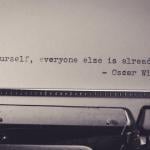
I think there is a Black woman out there who might think my husband is some racist White man in leadership at a local health-focused grocery store.
And it is not the case.
Besides how can he be racist when he is married to a Black woman? Come on, some of his best friends are— Okay, I am being snarky.
Let me tell you how it all unfolded.
It Started With a Date
A couple of nights after Thanksgiving, my husband (Hubby) and I went on a date. In the spirit of transparency, I pulled a possibly bad-wife move because a few days prior I wanted to cancel because— hello, not enough workouts in the world to combat Turkeygeddon, okay. I admit my behavior did not inspire relationship goals material for the interwebs.
After hearing and sensing his disappointment, as well as recognizing the difficulty he had in getting reservations at this new schmancy restaurant, I threw my bogus request out the window. Besides, what is a little extra fluff to keep the marriage fires burning, right? I decided to file it under the “more to love” chronicles and keep it going.
With Project More to Love in full effect, we went out.
I patted myself on the back for opting out of wearing post-holiday sweatpants with an elastic waistband for a “make a church mother faint” dress. We had a marvelous time with lots of laughter.
Laughter is a good sign.
And, meh. I did not care for the dessert options. I mean, you do not go from traditional holiday desserts to a piece of pumpkin cake nestled on some French stuff that the waitress pretty much called it for what it was: “cream cheese” mixture, sprinkled with pomegranate seeds, dowsed with pomegranate syrup and slapped beside ice cream.
Not today, Holiday Satan. Not today.
We ended up at a health-focused grocery store.
As I pondered my options, Hubby said, “I’m going to run to the restroom.”
“Okay.”
Shortly thereafter, he returned, and we wrapped up this leg of the night.
I was wrong.
Apparently, while I was stewing over sweet treats like the mysteries of the universe, trouble brewed in another section of the store.
The Case of Mis-Microaggressions
On our way home from the store, my husband informed,
“When I was on my way to the restroom, a Black woman stopped me and asked if I worked there. When I said, ‘No,’ she gave me this look.”
He proceeded to show me the look.
Egads.
She did not believe him.
I thought I recognized the look the woman gave him.
I was unsure if it was the “I do not believe you, shady White person. You just do not want to help me” look or if it was “ I do not believe you. You just do not want to help.” look.
If the former, I think Harriet Tubman herself created this look and passed it down through Black woman facial expression history. After all, Harriet did not wait for White plantation owners help her become physically free. She gave them a look and took matters into her own hands.
[A brief caveat to Black women readers: If you are a Black woman who believes you have never experienced racism or sexism-or who have never been treated rather questionably by White people in the world of commerce, then you might not understand the aforementioned. Nottattall (one word). I urge you to try to understand that other Black women have these experiences.]
With my curiosity now picking up where my sweet tooth left off, I tried to figure out how this misunderstanding happened, which was difficult without having a conversation with the offended party.
Did she think Hubby was a racist jerk, or a sexist jerk, or a racist and sexist jerk, or a jerk-jerk? What would compel the woman to think he lied about working there? Did she think that men are liars or White men are liars, or did she have a complex about trusting corporate-types—or White male corporate types? Is she a liar who projects her lies on others? Fascinating possibilities to consider.
Ah ha!
I said to Hubby, “You are dressed similarly to whenever this store has the corporate guys visiting.”
Hubby rebutted, “But at eight o’ clock on a Saturday night? I can see if it was daytime on a weekday.”
Good point.
Then, we slowly walked through what happened.
Wearing my invisible detective hat, I inquired, “How did she ask you? Did it sound like she thought you were attempting to cut her in line at the seafood department, or did it sound like she needed help?”
“She sounded like she needed help.”
Gosh, darn it.
My next question, “Where did you go after she asked you?”
“I walked back to the restroom.”
Double gosh, darn it.
She probably thought he walked to the back of the store and not the restroom, too. Both were in the same direction.
I think a Black woman saw a White man who looked like he was from corporate, walking like he was on a mission (unbeknownst to her it was not grocery, but restroom business), as he headed to the back of the store. Although he gave her an honest answer, she knew he worked there. Her experience, from her point-of-view, can easily join other accounts of microaggressions. Except, this account is inaccurate. Since there seems to be a social justice term for everything, how do you categorize this event, anyway? A mis-microaggression?
Amusing my husband, I suggested, “You probably need to issue an apology on behalf of the store. Isn’t this what White people do now—Hold a press conference, give a statement, or issue an apology via social media?”
With a slight grin, he replied, “I think she needs to issue an apology to me.”
Well, ain’t that the truth.
Instead of a case of mis-microaggressions, I know there is a chance that it could be a person seeing another human who is unwilling to help or possessing poor leadership skills. Given the salience of race in the United States, chances are more than likely this is not the case. Although Hubby and I choose to live free from the “what if’s” of the mis-microaggression, this honest misunderstanding gave me another opportunity to think about race.
No-Win Dynamics in Race
When I reflect on the situation, my husband answered honestly, and this woman refused to believe him. It is similar to how the majority in the United States deals with race—or even each other.
I am speaking to what I consider no-win dynamics. In no-win dynamics, parties already have their minds made up, leaving minimal space for reasoning or understanding before we even enter the room, let alone sit down together at the table.
What is the point of asking the question in the first place if we plan to rely on our assumptions? What is the point of engaging anyway, if our responses will be met with a negative attitude? Some of us are more determined feel right and remain in our pride than seek understanding and agreement. While there are White people who are still being intentionally and unintentionally racist in their words and actions, there are also White people who are not afforded any grace in this whole race thing. I have observed numbers of People of Color who, despite intentions, engage as if they want White people to walk around feeling miserable for being White. No matter what White people say or do, there is no moving forward. Then, we have certain White people who refuse to even acknowledge racism when it happens, or take ownership when they say or do something problematic. They would rather dig their heels in their pride than contribute to the real progress they claim to want. These no-win dynamics get in the way of “moving beyond” race.
In order to make sense of the world, as social beings, all of us use different cues from other people’s identities in relation to ours. Identities can turn what we perceive as a straight forward situation into the opposite. When we interact with others, their experiences and perceptions of our identities (i.e. via actions, speech, and appearance, etc.) can generate a different interpretation than ours.
Despite any of our good intentions, situations can get easily misconstrued. These moments can feel like an aggravating pebble in our shoes, causing irritation with each step.
Being the humans that we are, any of us can project our experiences and beliefs on others. Or we make assumptions because we see certain identity markers that signal to us what we think we know about somebody. I appreciate that my husband chooses to recognize that race can be a factor in different social situations. I respect that he pauses to consider how his identities are involved as much as others, instead of feigning ignorance or propping up his Black wife, to justify problematic racial thinking. It can be easy in the hurried pace of many of our lives to not consider the ways our identities shape power dynamics at home, work, play, worship—even an exchange at a grocery store. As previously noted, countless factors could have influenced this woman’s response to my husband.
Risk and Trust to Move Forward
Moving forward together across race requires risk and trust for everyone involved. Because of a legacy of racial issues in the U.S. that goes unacknowledged or even minimized by numerous White individuals, I think it requires risk for different People of Color to trust White people, who give an honest answer, without reading racist motives into their actions. Societal progress within the United States, likewise requires White people to listen without defensiveness to People of Color because race, perhaps, did play a factor in a problem, even if they do not want it to be case. Understanding that all of us will drop the ball as we work through pasts and identities, growing together requires honesty, risk, trust, healthy boundaries, and wisdom. Better yet, I think these principles can simply help us to improve as partners, colleagues, spouses, parents, friends, and especially strangers in a grocery store.
I appreciate how different people might feel exhausted by stopping to raise questions or examine a situation. I understand that some of us think that by ignoring race, it goes away. When we do not bother to at least consider race, religion, ethnicity, sexual orientation, gender, ability, class, etc. dynamics in social interactions, we risk ignoring real issues in need of addressing. Indeed, ignoring race, for example, with our colorblind kindness makes matter worse because we do not face the real issues. Right now, all over the world, not just the United States, we can stand to make time to consider the roles our identities influence in minor to major situations. By examining how our different identities come into play, we expand the way we think and engage with each other with more understanding. It takes more of our time, effort, and intention to check and question. If these types of sacrifices can bring more peace and understanding in the world, I think it is worth pausing to simply check.
SaveSave
SaveSave
SaveSave
SaveSave
SaveSave
SaveSave
SaveSave
SaveSave
SaveSave












